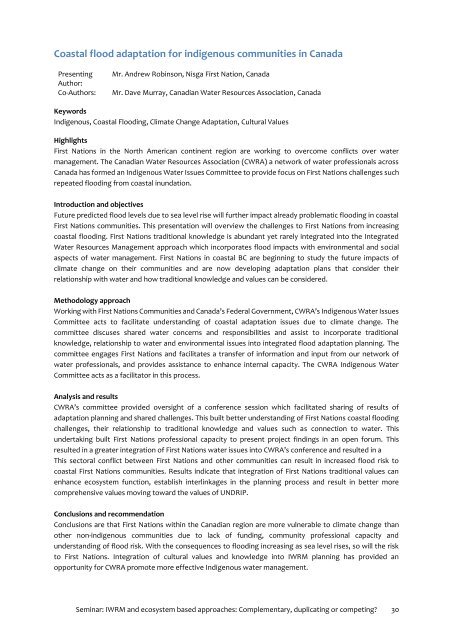2018 Abstract Volume
A compilation of the oral and written scientific presentations chosen to be part of World Water Week 2018 Seminars.
A compilation of the oral and written scientific presentations chosen to be part of World Water Week 2018 Seminars.
You also want an ePaper? Increase the reach of your titles
YUMPU automatically turns print PDFs into web optimized ePapers that Google loves.
Coastal flood adaptation for indigenous communities in Canada<br />
Presenting<br />
Author:<br />
Co-Authors:<br />
Mr. Andrew Robinson, Nisga First Nation, Canada<br />
Mr. Dave Murray, Canadian Water Resources Association, Canada<br />
Keywords<br />
Indigenous, Coastal Flooding, Climate Change Adaptation, Cultural Values<br />
Highlights<br />
First Nations in the North American continent region are working to overcome conflicts over water<br />
management. The Canadian Water Resources Association (CWRA) a network of water professionals across<br />
Canada has formed an Indigenous Water Issues Committee to provide focus on First Nations challenges such<br />
repeated flooding from coastal inundation.<br />
Introduction and objectives<br />
Future predicted flood levels due to sea level rise will further impact already problematic flooding in coastal<br />
First Nations communities. This presentation will overview the challenges to First Nations from increasing<br />
coastal flooding. First Nations traditional knowledge is abundant yet rarely integrated into the Integrated<br />
Water Resources Management approach which incorporates flood impacts with environmental and social<br />
aspects of water management. First Nations in coastal BC are beginning to study the future impacts of<br />
climate change on their communities and are now developing adaptation plans that consider their<br />
relationship with water and how traditional knowledge and values can be considered.<br />
Methodology approach<br />
Working with First Nations Communities and Canada’s Federal Government, CWRA’s Indigenous Water Issues<br />
Committee acts to facilitate understanding of coastal adaptation issues due to climate change. The<br />
committee discuses shared water concerns and responsibilities and assist to incorporate traditional<br />
knowledge, relationship to water and environmental issues into integrated flood adaptation planning. The<br />
committee engages First Nations and facilitates a transfer of information and input from our network of<br />
water professionals, and provides assistance to enhance internal capacity. The CWRA Indigenous Water<br />
Committee acts as a facilitator in this process.<br />
Analysis and results<br />
CWRA’s committee provided oversight of a conference session which facilitated sharing of results of<br />
adaptation planning and shared challenges. This built better understanding of First Nations coastal flooding<br />
challenges, their relationship to traditional knowledge and values such as connection to water. This<br />
undertaking built First Nations professional capacity to present project findings in an open forum. This<br />
resulted in a greater integration of First Nations water issues into CWRA’s conference and resulted in a<br />
This sectoral conflict between First Nations and other communities can result in increased flood risk to<br />
coastal First Nations communities. Results indicate that integration of First Nations traditional values can<br />
enhance ecosystem function, establish interlinkages in the planning process and result in better more<br />
comprehensive values moving toward the values of UNDRIP.<br />
Conclusions and recommendation<br />
Conclusions are that First Nations within the Canadian region are more vulnerable to climate change than<br />
other non-indigenous communities due to lack of funding, community professional capacity and<br />
understanding of flood risk. With the consequences to flooding increasing as sea level rises, so will the risk<br />
to First Nations. Integration of cultural values and knowledge into IWRM planning has provided an<br />
opportunity for CWRA promote more effective Indigenous water management.<br />
Seminar: IWRM and ecosystem based approaches: Complementary, duplicating or competing? 30


















